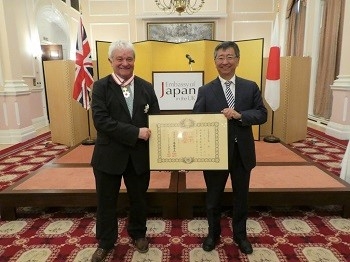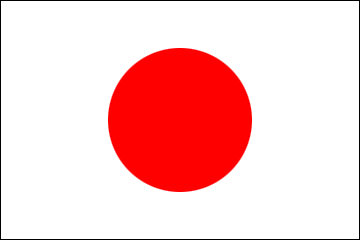Japanese Government honours Sir Paul Nurse
2019/5/3
On Wednesday 24 April 2019, Ambassador Tsuruoka bestowed the Order of the Rising Sun, Gold and Silver Star upon Sir Paul Nurse in recognition of his invaluable contribution to promoting research exchange and science and technology cooperation between Japan and the United Kingdom.
 Sir Paul Nurse has held a number of prominent science and academic positions in the UK, enjoying many significant achievements in the field of biology and making valuable contributions to the promotion of UK-Japan academic exchange. While President of the Royal Society, Sir Paul collaborated with the Science Council of Japan and other national science councils, taking the lead in coordinating science and technology-related proposals towards the G7/G8 Summits every year from 2011 to 2015. At the G8 Science Ministers and National Science Academies meeting held at the Royal Society in 2013, Sir Paul led discussions and played a coordinating role in producing the joint statement recommending the global issues that the G8 should address, and contributed to strengthening science and technology cooperation between Japan, the UK and other countries in the G8.
Sir Paul Nurse has held a number of prominent science and academic positions in the UK, enjoying many significant achievements in the field of biology and making valuable contributions to the promotion of UK-Japan academic exchange. While President of the Royal Society, Sir Paul collaborated with the Science Council of Japan and other national science councils, taking the lead in coordinating science and technology-related proposals towards the G7/G8 Summits every year from 2011 to 2015. At the G8 Science Ministers and National Science Academies meeting held at the Royal Society in 2013, Sir Paul led discussions and played a coordinating role in producing the joint statement recommending the global issues that the G8 should address, and contributed to strengthening science and technology cooperation between Japan, the UK and other countries in the G8.
In addition to this, he has done much to promote Japan-UK academic exchange by strengthening collaboration with Japanese academic institutions, including recommending participants from the Royal Society to the Japan Society for the Promotion of Science’s research programmes. Following the Great East Japan Earthquake in 2011, he made efforts to maintain and expand Japan-UK academic exchange through a letter to the Embassy of Japan in the UK and the Science Council of Japan.
In 2010, Sir Paul joined the STS Forum as a Council Member, contributing to the management of the forum, helping set the agenda, selecting speakers, and has taken an active role in the discussions by visiting Japan to attend and speak at the Forum as a representative of UK academia. Furthermore, as a member of the first Hideyo Noguchi Africa Prize Committee, Sir Paul visited Japan to attend the committee meeting in order to discuss the final selection of candidates for this award, who would then be recommended to Japan’s Prime Minister for his final decision. Through Sir Paul’s involvement, he helped widen the reach of Japan’s efforts in tackling infectious diseases to be known to the international community.
Sir Paul has also given a number of presentations in Japan, not only to experts, but to a wide range of general audiences, and worked to enliven Japan-UK academic exchange. Until now, including in his role as Director at the Francis Crick Institute, Sir Paul has welcomed many Japanese researchers, helping them to develop their skills in the field of biology, as well as promoting Japan-UK research collaboration over many years through joint research papers and projects.
In his speech, Ambassador Tsuruoka paid tribute to Sir Paul’s long list of achievements and expressed his appreciation to Sir Paul for his efforts towards Japan-UK academic exchange, and for promoting Japan’s efforts in scientific and academic fields overseas. Ambassador Tsuruoka also emphasised the importance of international collaboration in science and research, and talked of how it was fitting that Sir Paul’s decoration would be one of the last awarded by the outgoing Emperor as part of the Heisei period, before the new Reiwa period begins on 1 May 2019.
During his acceptance speech, Sir Paul expressed his gratitude to Ambassador Tsuruoka and Japanese government for the award, and talked with great fondness of his many visits to Japan throughout his career. He praised Japan for its beauty and uniqueness, and finished his speech with a couple of his favourite haiku poems.
 Sir Paul Nurse has held a number of prominent science and academic positions in the UK, enjoying many significant achievements in the field of biology and making valuable contributions to the promotion of UK-Japan academic exchange. While President of the Royal Society, Sir Paul collaborated with the Science Council of Japan and other national science councils, taking the lead in coordinating science and technology-related proposals towards the G7/G8 Summits every year from 2011 to 2015. At the G8 Science Ministers and National Science Academies meeting held at the Royal Society in 2013, Sir Paul led discussions and played a coordinating role in producing the joint statement recommending the global issues that the G8 should address, and contributed to strengthening science and technology cooperation between Japan, the UK and other countries in the G8.
Sir Paul Nurse has held a number of prominent science and academic positions in the UK, enjoying many significant achievements in the field of biology and making valuable contributions to the promotion of UK-Japan academic exchange. While President of the Royal Society, Sir Paul collaborated with the Science Council of Japan and other national science councils, taking the lead in coordinating science and technology-related proposals towards the G7/G8 Summits every year from 2011 to 2015. At the G8 Science Ministers and National Science Academies meeting held at the Royal Society in 2013, Sir Paul led discussions and played a coordinating role in producing the joint statement recommending the global issues that the G8 should address, and contributed to strengthening science and technology cooperation between Japan, the UK and other countries in the G8.In addition to this, he has done much to promote Japan-UK academic exchange by strengthening collaboration with Japanese academic institutions, including recommending participants from the Royal Society to the Japan Society for the Promotion of Science’s research programmes. Following the Great East Japan Earthquake in 2011, he made efforts to maintain and expand Japan-UK academic exchange through a letter to the Embassy of Japan in the UK and the Science Council of Japan.
In 2010, Sir Paul joined the STS Forum as a Council Member, contributing to the management of the forum, helping set the agenda, selecting speakers, and has taken an active role in the discussions by visiting Japan to attend and speak at the Forum as a representative of UK academia. Furthermore, as a member of the first Hideyo Noguchi Africa Prize Committee, Sir Paul visited Japan to attend the committee meeting in order to discuss the final selection of candidates for this award, who would then be recommended to Japan’s Prime Minister for his final decision. Through Sir Paul’s involvement, he helped widen the reach of Japan’s efforts in tackling infectious diseases to be known to the international community.
Sir Paul has also given a number of presentations in Japan, not only to experts, but to a wide range of general audiences, and worked to enliven Japan-UK academic exchange. Until now, including in his role as Director at the Francis Crick Institute, Sir Paul has welcomed many Japanese researchers, helping them to develop their skills in the field of biology, as well as promoting Japan-UK research collaboration over many years through joint research papers and projects.
In his speech, Ambassador Tsuruoka paid tribute to Sir Paul’s long list of achievements and expressed his appreciation to Sir Paul for his efforts towards Japan-UK academic exchange, and for promoting Japan’s efforts in scientific and academic fields overseas. Ambassador Tsuruoka also emphasised the importance of international collaboration in science and research, and talked of how it was fitting that Sir Paul’s decoration would be one of the last awarded by the outgoing Emperor as part of the Heisei period, before the new Reiwa period begins on 1 May 2019.
During his acceptance speech, Sir Paul expressed his gratitude to Ambassador Tsuruoka and Japanese government for the award, and talked with great fondness of his many visits to Japan throughout his career. He praised Japan for its beauty and uniqueness, and finished his speech with a couple of his favourite haiku poems.
The Embassy of Japan
